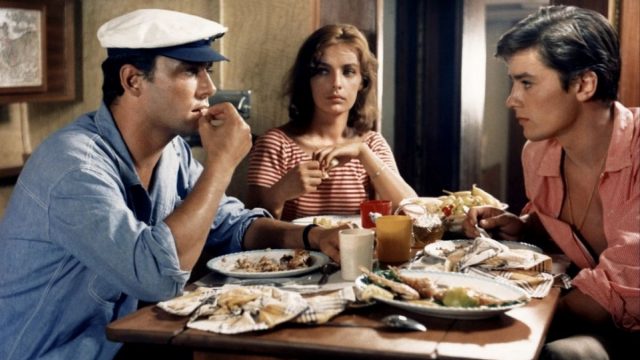As the physical centerpiece of Purple Noon, René Clément’s adaptation of The Talented Mr. Ripley, Alain Delon is a beautiful, inscrutable object. It’s partly Delon’s extraordinary physical beauty that makes Purple Noon its own work, distinct from pure adaptation: it strips Ripley of his awkwardness, of the sense that one of the reasons he kills is because he can no longer finesse. Delon’s Ripley is a different creature, one totally at ease in his own skin. He can finesse endlessly. His talent is for handling things lightly. Philip Seymour Hoffman’s brash Freddie Miles is a threat to Ripley from the moment he appears, because Damon’s Ripley doesn’t have the ability to shake off his contempt. Billy Kearns’s Miles, in Purple Noon, becomes a problem only when he gets one piece of information too many. Before that, Ripley can deal with him smoothly, without breaking stride. When Miles asks what Ripley does for a living:
Tom Ripley: Nothing. And you?
Freddy Miles: Nothing. But I have my own dough.
Tom Ripley: [nodding to Philippe] He has his and I have other people’s.
Only here is Ripley’s self-effacement witty and casual rather than excruciating. Telling the truth so nakedly that it somehow seems like a lie is almost his go-to strategy: he effectively tells Philippe he’s going to murder him and steal his identity, and then he does. That’s impressive, like a magic trick that fools the audience even when they already saw the rabbit hop into the hat.
The film makes the most of Ripley’s flawless surface. It starts in media res, with Ripley already on his “assignment” in Italy and already ignoring it. He could earn five thousand dollars by persuading Philippe Greenleaf to go home, but why settle for a flat fee when he can sponge off Philippe indefinitely? The fundamentals of Ripley’s backstory are meted out slowly, and they never quite solidify. Is Philippe right when he tells Marge that all of Ripley’s stories about their shared childhood are made up? Is he right that they never met before now? Or is Philippe–whom Maurice Ronet plays with a spot-on sense of casual, laddish cruelty–simply too self-involved to remember him? We can’t know for sure. But his looks, as Son of Griff said, are movie star looks, and they allow and encourage other characters–and the audience–to project characterization upon him.
He encourages that, particularly in the case of Marge (Marie Laforêt, stunning in her first role). Laforêt is as beautiful as Delon, but Clément uses her beauty differently. He first positions her as the uneasy bystander to the competitive, cruel, charged relationship between Ripley and Philippe; when she objects to Philippe’s bullying of Tom–in part because she is unwilling to object to his equally appalling treatment of her–she’s drawing a direct line of comparison between them, subtly implying that she and Tom are both subordinate to Philippe, that their role in his life is close to being the same. If so, she’s the openly acknowledged fiancée, and Ripley is the bit on the side, the one Philippe more actively vents his cruelty on. But Marge doesn’t resent Ripley for it: instead, she pities him and cares for him, and that tenderness suffuses her character, giving her more substance than Ripley ever has. Henri Decaë shoots her like she’s a madonna, using the outer beauty as a channel to the inner. She is full where Ripley is empty.
It makes sense, then, for the film to come down to the two of them and to Ripley’s attempt to take advantage of Marge’s goodness and innocence, her assumption that they’re alike. He tells her the truth–in such a way, as always, that it’s a lie–and then presents himself as a shoulder for her to cry on. He knows, by the time he kisses her, that she’ll accept this sea change in their relationship as a natural occurrence, even a positive one, with the two of them, equals, used in the same way and mourning in the same way, now able to heal together. It will be different with Tom, you can almost see her telling herself.
It ought to be that dark ending, darker even than the novel’s; it feels like a distant cousin to the ending of Graham Greene’s Brighton Rock. But alas, for all his superficial talents, this Ripley turns to be bad at the one thing murderers really, really need to be good at: body disposal. In a way, that’s fitting. In Ripley’s own private theater, he’s projected on himself. He’s the man who gets away with it. He forgets that all his projections are just light and shadow.
Purple Noon is streaming on the Criterion Channel.

